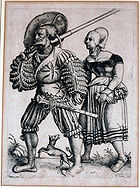
Tross
Encyclopedia

Camp follower
Camp-follower is a term used to identify civilians and their children who follow armies. There are two common types of camp followers; first, the wives and children of soldiers, who follow their spouse or parent's army from place to place; the second type of camp followers have historically been...
contingent of the Landsknecht
Landsknecht
Landsknechte were European, predominantly German mercenary pikemen and supporting foot soldiers from the late 15th to the late 16th century, and achieved the reputation for being the universal mercenary of Early modern Europe.-Etymology:The term is from German, Land "land, country" + Knecht...
mercenary regiments which originated at the end of the fifteenth century and were the dominant form of infantry mercenary force throughout the sixteenth century. Each Landsknecht unit traveled with a Tross contingent, which followed behind. They carried the military and fighting necessities, the food and the belongings of each "soldat
Soldier
A soldier is a member of the land component of national armed forces; whereas a soldier hired for service in a foreign army would be termed a mercenary...
" ("soldier") and his family. Members of the Tross were made up of women, children, craftsmen and day laborers. The term "support staff" can be used to give the German word a clearer meaning, although its true English translation is "Unit train" or "Baggage train".
Many women of the Tross were wives of the soldiers, or other family members such as sisters, nieces, or daughters. Some of the women were betrothed to a member of the military unit. Very few single, unattached women were permitted into the ranks of the Tross in fear that their possible turn to prostitution would cause unrest in the baggage train by disrupting family relationships. Unattached women allowed into the Tross were those who possessed a skill or trade which made them a valuable asset not only to the Tross unit but to the military unit as well. However, they were closely watched until they took a legitimate husband. In addition were supporting craftsmen and Sudlers/merchants of all kinds.
The custom of a regiment being followed by the Tross continued beyond the period of the Landsknechts. During the Thirty Years' War
Thirty Years' War
The Thirty Years' War was fought primarily in what is now Germany, and at various points involved most countries in Europe. It was one of the most destructive conflicts in European history....
, it could occur that a 1,000 man regiment would be accompanied by 500 women and 300 children. The Tross was indispensable for supply purposes, although it limited the freedom of movement of the army. At times the Tross fell prey to the opposing army.

